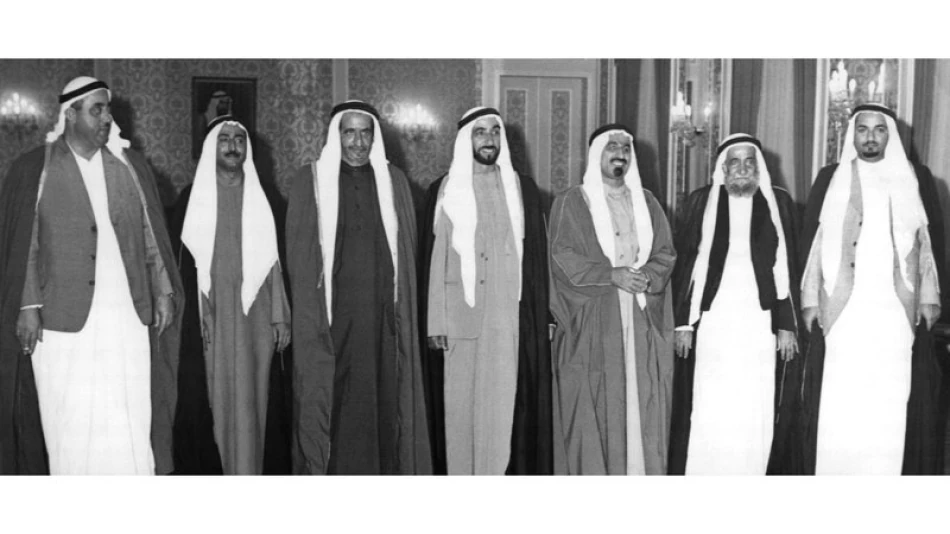
United Arab Emirates National Day: The Inspiring Story of a Nation's Remarkable Achievements
UAE Celebrates Foundation Day as Leaders Highlight Union's Transformative Legacy
The United Arab Emirates marked its annual Union Pledge Day on July 18, with government ministers and officials emphasizing how the historic signing of the union document and constitution created a unique model for modern nation-building. The commemoration underscores the UAE's evolution from a collection of emirates into a global economic powerhouse that has become a template for successful federation governance in the Middle East.
A Blueprint for Modern Federation
Sheikh Salem bin Khalid Al Qasimi, Minister of Culture, described the anniversary as representing "a legal and historical foundation for building a modern state capable of keeping pace with transformations and achieving aspirations." He emphasized that the UAE's union experience stands as a unique model for building modern states based on pluralism and social harmony.
This assessment reflects the UAE's distinctive approach to federalism, which has successfully balanced local emirate autonomy with national unity—a feat that has eluded many other federal experiments in the region. Unlike other Arab federations that have struggled with sectarian or tribal divisions, the UAE's model has created lasting stability through economic interdependence and shared prosperity.
Economic Vision Driving National Unity
Minister of Economy and Tourism Abdullah bin Touq Al Marri highlighted how Union Pledge Day reinforces "the spirit of belonging and loyalty in the consciousness of generations" while renewing national cohesion around the leadership. His remarks underscore how the UAE has successfully linked economic development with national identity—a strategy that has proven particularly effective in attracting foreign investment and talent.
The economic dimension of the union has been crucial to its success. By creating a common market and coordinated development policies, the emirates transformed from pearl-diving and trading communities into a diversified economy that now serves as a regional hub for finance, logistics, and technology.
Human Capital as National Strategy
Dr. Sultan bin Saif Al Neyadi, Minister of State for Youth Affairs, emphasized that the union document represented "more than just a political agreement—it was a declaration of an integrated civilizational vision" based on the belief that investing in human capital is the core of the national project.
This focus on human development has become a defining characteristic of the UAE model. The country's investment in education, healthcare, and skills development has created a knowledge-based economy that attracts global talent while developing local capabilities. This approach contrasts sharply with resource-dependent economies that have failed to diversify.
Institutional Continuity and Adaptive Leadership
Minister of Health and Community Protection Abdul Rahman bin Mohammed Al Owais stressed the importance of "unity of purpose and national objectives," while renewing loyalty to the leadership established by founding father Sheikh Zayed and his fellow founders.
The UAE's success in maintaining institutional continuity while adapting to global changes has been remarkable. The country has navigated oil price volatility, regional conflicts, and global economic shifts while maintaining political stability and economic growth. This adaptability has made it a preferred destination for international businesses seeking regional headquarters.
Global Implications of the UAE Model
Education Minister Sarah bint Yousif Al Amiri described Union Pledge Day as representing "an enduring covenant established by great leaders" that has made the UAE a unique developmental model in leadership and investment in human capital.
For international observers, the UAE's federal model offers valuable lessons in how diverse political entities can unite around shared economic interests while maintaining cultural distinctiveness. This has particular relevance for other regions attempting political and economic integration.
Regional Leadership Through Soft Power
The ministers' emphasis on the UAE as a model of "progress, love, and openness to other cultures and peoples" reflects the country's strategy of regional leadership through soft power rather than military dominance. This approach has enabled the UAE to maintain relationships across traditional regional divides while building a reputation as a reliable partner for global powers.
The celebration of Union Pledge Day thus serves not only as a domestic reminder of national achievements but also as a statement of the UAE's continued commitment to the federal model that has driven its transformation into a global city-state. For investors and international partners, it signals the stability and continuity that have made the UAE a cornerstone of regional economic development.
Most Viewed News

 Sara Khaled
Sara Khaled






